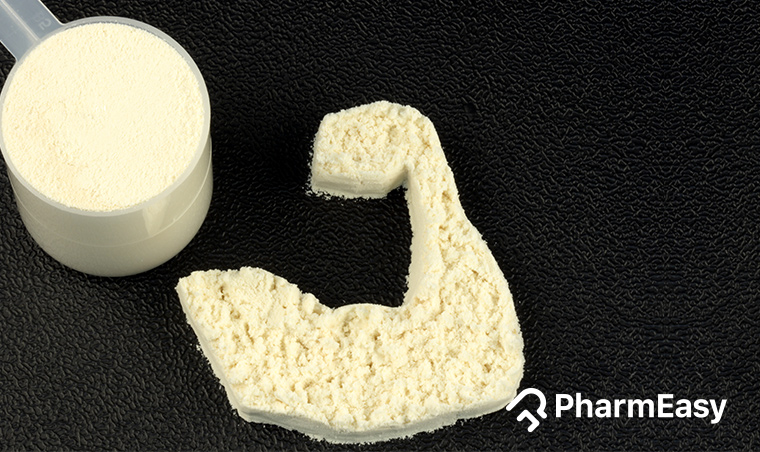Casein Vs. Whey Protein – Which Is Healthier?
By Dr. Nikita Toshi +2 more

Get,

to manage your symptom
Get your,


4 Cr+ families
benefitted

OTP sent to 9988776655



You’ve successfully subscribed to receive
doctor-approved tips on
Whatsapp

Get ready to feel your best.

Hi There,



Register to Avail the Offer
Send OTPBy continuing, you agree with our Privacy Policy and Terms and Conditions

Hi There,

Trusted by 4 crore+ families

OTP sent to 9988776655



You have unlocked 25% off on medicines




Code: NU25

By Dr. Nikita Toshi +2 more

Did you know? Cow’s Milk is roughly 80 percent Casein and 20 percent Whey. Within the global fitness community, these two dairy-based protein supplements are undoubtedly the most popular choices and for a good reason.
Whey and Casein are high-quality, highly bioavailable, complete proteins rich in essential amino acids, making them the perfect workout partner for muscle build-up and repair.
Despite the unique benefits, protein brands are often pitting Casein against Whey, claiming the former is better than the latter and vice versa. In today’s blog, we look at key differences between the two and help you decide which one’s a better fit for your needs?
Table of Contents
Are you confused about which of the two proteins is better suited to your needs? Here’s a thorough side-by-side comparison to help you make an informed choice.
Both protein powders are incredibly versatile when mixing them with other ingredients. You can mix them with water, milk, oats, peanut butter, Greek yoghourt or your favourite protein shake. People with diabetes, prediabetes and obesity should stay away from added sugar or carbs while choosing their protein supplement.
For muscle growth to happen, protein synthesis needs to be greater than muscle breakdown. Since whey increases protein synthesis and casein prevents muscle breakdown, both proteins, taken strategically, can help you build muscle
Dr. M.G. Kartheeka, MBBS, MD
The key difference between whey and casein lies in the amino acid profile of the two proteins. There are fewer BCAAs in casein as compared to whey, but higher levels of histidine, phenylalanine, and methionine all essential amino acids that promote muscle repair, an ideal ratio of 50% Milk protein isolate and 50% whey protein concentrate, or isolate is best for adequate muscle growth.
Dr. Ashish Bajaj, M.B.B.S., M.D.
Both Whey and Casein are extremely nutritious protein supplements that would pair well with your fitness goals. What determines the pick for you is a simple question: What are you looking for in a protein powder?
Are you trying to reform your binge-eating addiction and gunning for weight loss? Pick Casein! It will also help build muscles, only gradually with exercise.
Whereas, if you are a gym beast trying to get amino acids into the system quickly and lift heavy weights, Whey protein should be your gym bestie.
If you are planning to try a protein supplement for the first time, watch for any symptoms of allergy and don’t forget to check the list of ingredients for a known allergen. It is possible that people with or without lactose intolerance and gluten sensitivity may present with intolerance to whey or casein. Talk to your doctor before starting any new supplements.
Lastly, it’s important to remember that both protein powders, Casein and Whey, are dairy-based products, so if you have a hard time digesting dairy, you might want to explore other protein powders like soy protein or pea protein.
Also Read: What Foods Have Collagen: Your Ultimate Guide Based on Research
Disclaimer: The information included on this site is for educational purposes only and is not intended to be a substitute for medical treatment by a healthcare professional. Because of unique individual needs, the reader should consult their physician to determine the appropriateness of the information for the reader’s situation.

Leave your comment...
Comments